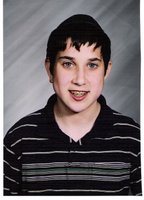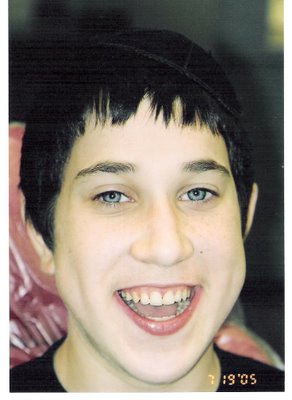D'var Torah Presented at the Annual Dinner of the Hebrew High School of New England by Rabbi Daniel Loew, Principal
Delivered April 9, 2006. RE: Exodus 14-15
...As someone raised in West Hartford, it is such a privilege to be the Head of Hebrew High School of New England. We have accomplished much and have so much to look forward to. However, as a community we have also experienced tragedy and I can’t get up to speak tonight without acknowledging the untimely loss of one of our students, Avi Lapidus of blessed memory. Avi was a ninth grader at HHNE who passed away suddenly in February. It was a shock for our school and community, and Avi is terribly missed. I am so proud of the way our students, our parents, and our faculty responded, doing everything in their power to comfort the Lapidus family and each other. Everyone felt the loss, and everyone wanted to be involved in supporting each other.
This theme, that the entire community is involved, is born out in a Gemara [passage from the Talmud] I’d like to share with you, half of which is very well known. In just a few days, we commemorate the Exodus from Egypt, the culmination of which was the splitting of the sea. There is a famous midrash [rabbinic story] recorded in the [Talmudic] tractate of Sotah that when the people stood with the sea in front of them and the Egyptian army behind them, they were paralyzed. They knew that they were to proceed into the sea, but it had not yet split, and each tribe tried to cajole the other to be the first to jump in. Until Nachshon ben Aminadav sprang forth into the sea and ran in until it was up to his neck, and at this demonstration of faith the waters finally split and the rest of the People followed.
However, this is the second opinion recorded in the Gemara, that of Rabbi Yehudah. The first, far less famous, reads as follows:
(Sotah 36b-37a)
According to Rabbi Meir, the tribes were not hesitant to go into the sea, but quite the opposite: they were competing for the privilege of being the first to listen to God’s wishes.
These two opinions indicate two models of communal leadership. Sometimes it is necessary to have a Nachshon, a fearless leader to jump in when no one else will take the plunge. However, our school was founded very differently. Each of our founding families, from New Haven, Springfield, and Hartford, though it took years of hard work, wanted the privilege of being involved in building something great. It was a communal effort. Our rallying this year in time of tragedy shows that we still have that same spirit.
May God grant us the strength to continue building this school as a community, with everyone involved.
...As someone raised in West Hartford, it is such a privilege to be the Head of Hebrew High School of New England. We have accomplished much and have so much to look forward to. However, as a community we have also experienced tragedy and I can’t get up to speak tonight without acknowledging the untimely loss of one of our students, Avi Lapidus of blessed memory. Avi was a ninth grader at HHNE who passed away suddenly in February. It was a shock for our school and community, and Avi is terribly missed. I am so proud of the way our students, our parents, and our faculty responded, doing everything in their power to comfort the Lapidus family and each other. Everyone felt the loss, and everyone wanted to be involved in supporting each other.
This theme, that the entire community is involved, is born out in a Gemara [passage from the Talmud] I’d like to share with you, half of which is very well known. In just a few days, we commemorate the Exodus from Egypt, the culmination of which was the splitting of the sea. There is a famous midrash [rabbinic story] recorded in the [Talmudic] tractate of Sotah that when the people stood with the sea in front of them and the Egyptian army behind them, they were paralyzed. They knew that they were to proceed into the sea, but it had not yet split, and each tribe tried to cajole the other to be the first to jump in. Until Nachshon ben Aminadav sprang forth into the sea and ran in until it was up to his neck, and at this demonstration of faith the waters finally split and the rest of the People followed.
However, this is the second opinion recorded in the Gemara, that of Rabbi Yehudah. The first, far less famous, reads as follows:
(Sotah 36b-37a)
According to Rabbi Meir, the tribes were not hesitant to go into the sea, but quite the opposite: they were competing for the privilege of being the first to listen to God’s wishes.
These two opinions indicate two models of communal leadership. Sometimes it is necessary to have a Nachshon, a fearless leader to jump in when no one else will take the plunge. However, our school was founded very differently. Each of our founding families, from New Haven, Springfield, and Hartford, though it took years of hard work, wanted the privilege of being involved in building something great. It was a communal effort. Our rallying this year in time of tragedy shows that we still have that same spirit.
May God grant us the strength to continue building this school as a community, with everyone involved.






0 Comments:
Post a Comment
<< Home